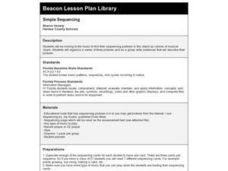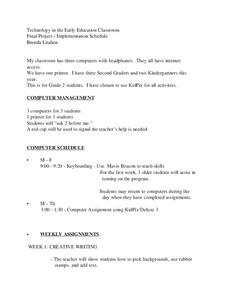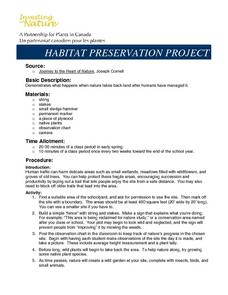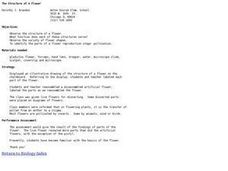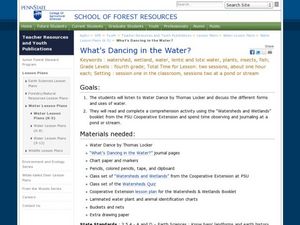Curated OER
Mapping a Garden
Second graders recognize the components of a map, particularly the legend, the key, the symbols and the area. They develop their own map of a garden they be planting in their upcoming science lesson plan.
Curated OER
Aerobic and Anaerobic Conditioning
Students view the A.D.A.M. computer simulation of aerobic and anaerobic exercise. They break into groups and members brainstorm and list as many aerobic and anaerobic exercises as possible in five minutes.
Curated OER
The Sun: An Introduction
Students write entries in their Science Journals as they explore the Sun.
Curated OER
Simple Sequencing
Fourth graders play a stand up version of musical chairs to find their sequencing partners. In this music and language arts activity, 4th graders enjoy a game that requires them to organize a series of three pictures, then write...
Curated OER
Science NetLinks: Fossils and Geologic Time
Students investigate the development of the geologic time scale. Also, to introduce them to the major time periods in earth's history, as well as to the role fossils play in helping us understand this history.
Curated OER
The Global Impact of Insect Borne Diseases & Agriculture
Students study the global impact of insect borne diseases, the appropriate use of pesticides, and the concept of human interrelations on a world wide scale. They examine how to safely apply a pesticide, according to the label.
Curated OER
Wind Power and Your Community
Students acquire knowledge about hydropower, diesel power, wind power, and how they are currently used in the north. They share what they have learned through a jigsaw activity.
Curated OER
Technology In The Early Education Classroom
Students participate in a lesson that uses technology in the classroom. The goal is the full integration of technology into the class schedule to be used in various subjects. They demonstrate gradual comprehension of technology use as...
Curated OER
Fossils and Geologic Time
High schoolers explore the development of the geologic time scale. They examine the major time periods in earth's history. Students discuss the role fossils play in helping us understand history.
Curated OER
Science: Birds in Flight
Students identify and examine adaptations in birds that enable them to fly. They conduct Internet research to relate these adaptations to the physics of flight. Students observe birds in flight and describe their behavior and flight...
Curated OER
Habitat Preservation Project
Students demonstrate what happens when nature takes back land after humans have managed it. They find an area in the schoolyard, and mark it off with a boundary. Students build a simple fence with string and stakes. They put up a sign...
Curated OER
Insects
In this insects worksheet, students read a short passage on insects and then answer 4 short answer questions on the lines provided.
Curated OER
The Structure of A Flower
Students study the structure of flowers. In this biology lesson plan, students observe the structure of a flower and find out what function each of the structures serve.
Curated OER
Extract Your Own DNA from Cheek Cells
Students observe their own DNA. In this DNA lesson, students learn the simple method of DNA extraction and explain why DNA extraction is important to scientists.
Curated OER
What's Dancing in the Water?
Students learn about watershed, as well as the different forms and uses of water. In this water forms lesson, students brainstorm water sources and uses. Students read the book Water Dance and discuss water examples. Students complete a...
Curated OER
Acid Rain: Where Have All the Rainbows Gone?
Students study the pH scale and sources of acid precipitation. In this acid rain lesson students complete a lab on acid rain then complete a handout.
Curated OER
Collecting Compost
Students observe a composting box. In this soil activity, students create a composting bin by using a bin, newspaper, worms, and food scraps. Students create a composting food web.
Curated OER
Earthquake Science Project
Students simulate the Earth's plates moving like an earthquake by using newspaper and soil. In this earthquake lesson plan, students push and pull the newspaper together that has soil on top and observe what happens.
Curated OER
Water Quality Monitoring
Students comprehend the four parameters of water quality. They perform tests for salinity, dissolved oxygen, pH and clarity or turbidity. Students comprehend why scientists and environmental managers monitor water uality and aquatic...
Curated OER
Goobers. Goobers? Goobers!
Students begin the lesson by noting the many ways in which to use peanuts. In groups, they use the internet to research the work of George Washington Carver. They discover the allergies and nutritional information of the peanut and...
Curated OER
Butterfly Camouflage
Fifth graders discuss camouflage and warnings by butterflies as a class. Students design and color their own butterflies that they are to place somewhere in the classroom. Students explain why their butterfly is colored the way that it...
Curated OER
Habitat Is Home
Students are introduced to the concept and components of a habitat. They discuss the key components of a habitat and describe how certain factors can cause disturbances in a habitat and change its population. Activities are leveled for...
Curated OER
Alternative Alphabet
Pupils determine and compare hieroglyph content and frequency to an alternative alphabet based on symbols that mimic sounds of the alphabet.
Curated OER
Which Way to Roots Grow?
Second graders explore roots and how they grow. They observe as seeds planted in various directions grow and record their observations. Students discuss the direction in which the roots are growing.





